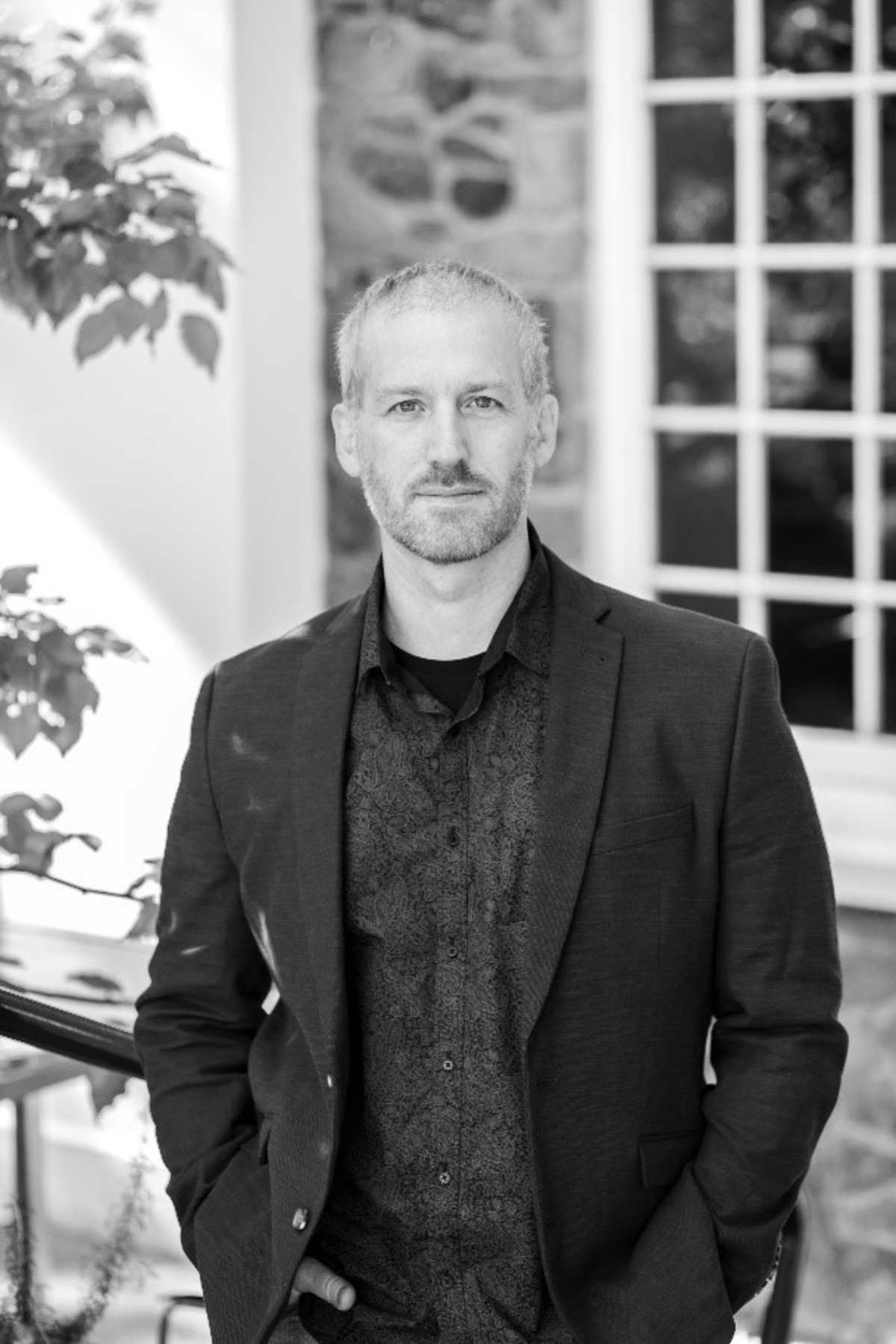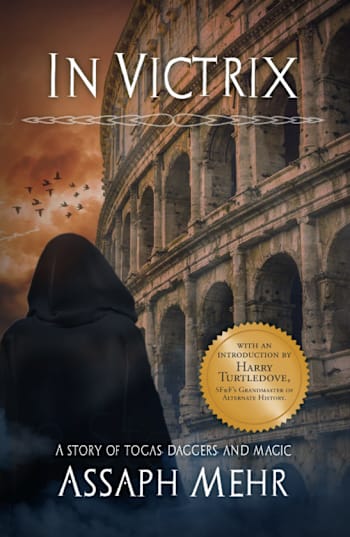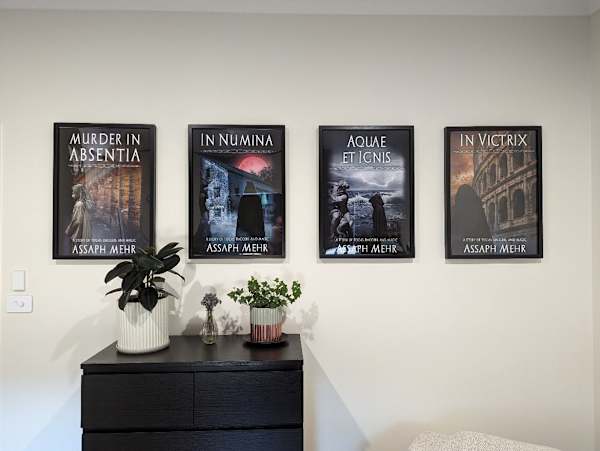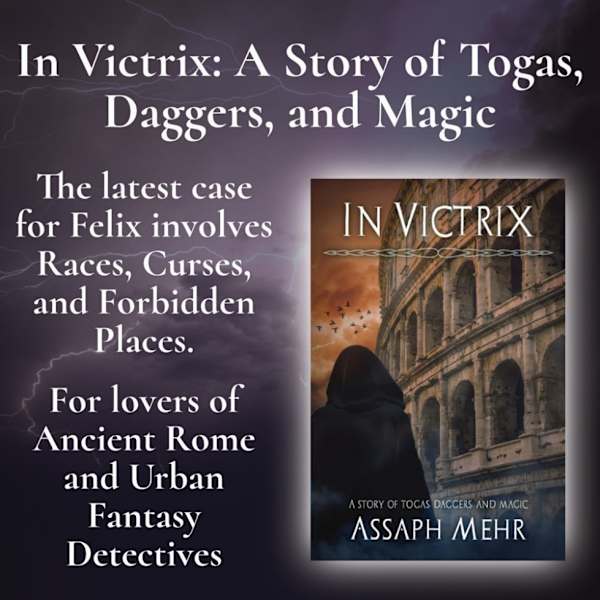Welcome back, folks! You know I have a soft spot for writers who build intricate, lived-in worlds, and today’s guest? He’s practically an architect of ancient Rome—with magic, mystery, and a whole lot of murder thrown in.
Assaph Mehr is the mind behind the Togas, Daggers, and Magic series, where private investigator Felix the Fox navigates a version of Rome where the gods are still meddling, magic is as practical as engineering, and crime—well, crime is still crime. His latest book, In Victrix, dives deep into curses, chariot races, and the politics of power, with enough twists and turns to make even a seasoned detective dizzy. Think Sherlock Holmes meets ancient Rome, with a splash of occult noir.
Mehr’s love for history runs deep—he’s been obsessed with ancient Rome since he got his hands on Asterix as a kid, and he’s been feeding that obsession ever since. He pulls from historical sources, his background in martial arts (because writing great fight scenes is an art), and his day job as a software product manager—because if you can manage developers, you can probably manage anything, including a magical crime spree.
Today, we’re going to dig into how he brings history and fantasy together, why magic in his world is more practical than mythical, and what’s next for Felix the Fox. So grab your laurel wreaths, maybe a good luck charm or two—because if Felix is involved, things are definitely about to get dangerous.
You can find Assaph Mehr’s work, including In Victrix, right here:
📚 Website: http://egretia.com
📚 Amazon Author Page: http://www.amazon.com/Assaph-Mehr/e/B015U1F3NC
📚 Newsletter (free novella!): https://egretia.substack.com/
📚 Character Interview Blog: http://TheProtagonistSpeaks.com
A book you’re looking forward to releasing (by someone else)?
Claws of the Collector by Douglas Lumsden. I loved his previous series—a noir paranormal detective in a rich alt-history world—and this one is promising to be even better!
Coffee, tea, or cacao?
Coffee in the morning, tea in the afternoon, and cocoa to keep the kids quiet so I can enjoy them in peace.
When did you first realize you wanted to be a writer?
Probably soon after I started reading. I always thought it would be something I’d do in retirement, until one evening (in my forties) when my wife complained she had finished everything she wanted to read. I started writing that night and haven’t stopped.
What is your work schedule like when you’re writing?
I wrote my first book at night, with a deadline to finish the first draft before my youngest was born. The second (and third) I wrote on the train to work. Then 2020 threw a bit of a spanner in the works, but now I’m back to writing at night.
Earlier this year, I was writing sporadically, but I wanted to make better progress. To get back into the habit, I swore to write at least one sentence every night. I usually write more (especially endings—those come in a rush), but even if I only write a few expletives to delete the next day, I find it encouraging to keep the writing streak going.
Where do you get your information or ideas for your books?
All the time and everywhere. I write historical fantasy, so I read a lot of non-fiction about the chosen time period. My first series is loosely based on life in Ancient Rome, while my next one is set in modern-day Tasmania. I also read blogs, news, visit libraries and museums, and dig through online collections.
As for story ideas, those are easy. They come at all times and from all places. The ones that stay and nag at me are the ones that get written.
Is there a trope you find yourself going back to in multiple works? Or one you avoid?
I love making magic an everyday part of the worlds I build. If it exists, humans would have exploited it—I don’t like the whole secret society and "muggles" concept. When I built the magic for the Togas, Daggers, and Magic series, I tried to emulate how Romans would have approached it, much like they did with math—by turning it into practical engineering.
Harry Turtledove, the grandmaster of alternate history and a historian, had this to say:
“Assaph Mehr’s Egretia is Rome as the Romans themselves imagined it to be. Magic really works. Curses curse, love philtres create love, oracles do predict the future, and on and on. The genuine Romans enacted laws against magic not because they thought it was a fraud but because they thought it wasn’t and feared what it would do if widely practiced.”
You can read his full introduction to my latest novel [here].
My next series, set in modern-day Tasmania, follows the case files of Detective Inspector Jack Finkel of the Unusual Crimes Squad. Because if humans can exploit something, they will—and not always in good ways. Magic is just part of life, but due to physical restrictions (like conservation laws), it ends up being about as lucrative a career as getting an arts degree. Almost.
What does your family think of your writing?
They are quite proud of it, as they’re all bibliophiles. My sister said she got a "book hangover" from my first novel, I convinced my brother-in-law to start writing as well, and my wife decorated my study to show her support.
What was one of the most surprising things you learned in creating your books?
Many random ancient Roman factoids. For example, the English word fascinate comes from the Latin fascinare, meaning "to put under a spell." That, in turn, came from the old god Fascinus—the divine phallus.
Yes, really. His image—often depicted as a winged phallus—was everywhere in Ancient Rome, used as an amulet for protection against evil spirits and the evil eye.
So, every time you’re fascinated by something, you’re essentially bewitched by a flying… well, you get the idea.
Do you have any suggestions to help someone become a better writer?
Absolutely. The three basic rules of writing (which I’m paraphrasing, not claiming as my own) are:
- If you want to write, write.
- Just put in the time. Consistency beats intensity—make it a habit.
- If you want to write good stories, read.
- Read inside and outside your genre. Read good fiction. Read bad fiction. Read voraciously and reflect on it.
- If you want to write well, work with editors.
- Learn to seek feedback and work with professionals. Check your ego at the door.
Do you hear from your readers much? What kinds of things do they say?
Happily, yes. I have a thick skin and read all my reviews. Occasionally, there’s a reader who doesn’t enjoy my books—no story is for everyone.
On balance, readers love the vibrancy of the world-building, the cheekiness of the protagonist, and the blend of occult mysteries and action.
As a child, what did you want to be when you grew up?
As a small child, I wanted to drive a rubbish truck because it was big, noisy, and smelly. As a teen, when my sister asked me this, I answered without hesitation: "Couch potato."
Does writing energize or exhaust you?
Not exhaust, but sometimes frustrates. When I’m stuck on a difficult section and my characters aren’t cooperating, I try to find ways to make them pay for it while also steering them back in the right direction.
Then, when I reach the ending, it’s an absolute rush. Pouring out the final crescendo of action and resolution is incredibly satisfying.
What other authors are you friends with, and how do they help you become a better writer?
Most certainly! Shout-out to Douglas Lumsden, Ellis “Skip” Knox, Rosie Chapel, Eric Klein, Brent A. Harris, and many others. The indie community is incredibly supportive, but these folks, in particular, have helped me tremendously with beta reading and editing insights. Check out their work!
Do you want each book to stand on its own, or are you building a connected body of work?
Each book is a standalone mystery, but there’s continuity in the characters’ lives and an overarching theme. I try to make it so readers can jump in at any point in the series without being lost.
What’s your favorite under-appreciated novel?
Bridge of Birds by Barry Hughart. It should be much better known than it is.
What do you have coming next?
I recently released the third novel in the Togas, Daggers, and Magic series: In Victrix – The Fates and the Furies. What starts as a curse on the people’s sacred chariot races soon spirals out of control, touching on women’s mysteries, public affairs, and the very fabric of politics and society.
I’m also working on a new series set in modern-day Tasmania, Australia—the case files of Detective Inspector Jack Finkel, Unusual Crimes Squad. The first novel, tentatively titled Small Town Djinn, is in progress. A flash fiction piece featuring him, Poor, Dead Larry, is available through my newsletter at egretia.substack.com.
And that, my friends, is how you blend history, magic, and a good old-fashioned murder mystery into something damn near irresistible. Assaph Mehr isn’t just writing books—he’s building a world where curses are just another day at the races, politics is deadlier than a dagger in the dark, and a smart-mouthed investigator somehow keeps surviving it all.
If you haven’t picked up In Victrix yet, what are you waiting for? Chariot races, ancient conspiracies, and enough twists to keep even the gods guessing—this one’s a must-read. And if you’re new to Togas, Daggers, and Magic, don’t worry. Felix the Fox will welcome you with a drink, a smirk, and a case that’ll drag you straight into the underbelly of his world.
Want more? Get your hands on the books, sign up for the newsletter, and dive into the The Protagonist Speaks, where Mehr lets his characters do the talking (and trust me, they’ve got plenty to say).
📚 Website: http://egretia.com
📚 Amazon Author Page: http://www.amazon.com/Assaph-Mehr/e/B015U1F3NC
📚 Newsletter (free novella!): https://egretia.substack.com/
📚 Character Interview Blog: http://TheProtagonistSpeaks.com
As always, keep reading, keep exploring, and if you do find yourself in ancient Rome, maybe stay away from the chariot tracks. Just saying.



